

Understanding MARC Authority Records: Parts 1 to 7. I t is impossible these days to read a library journal, attend a library conference, or even have an informal chat with other librarians without hearing the phrases "MARC format," "MARC records," or "MARC-compatible.
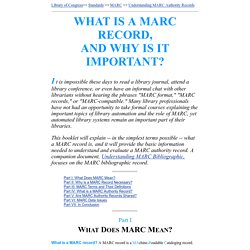
" Many library professionals have not had an opportunity to take formal courses explaining the important topics of library automation and the role of MARC, yet automated library systems remain an important part of their libraries. This booklet will explain -- in the simplest terms possible -- what a MARC record is, and it will provide the basic information needed to understand and evaluate a MARC authority record.
A companion document, Understanding MARC Bibliographic, focuses on the MARC bibliographic record. Part I: What Does MARC Mean? Part II: Why is a MARC Record Necessary? Digital Mappa. HIST3814o Crafting Digital History. Home - Digital Humanities - Research Guides at University of Tennessee Knoxville. Intro to Digital History 2015 : Adam Crymble. Intro to Digital History 2015 The goal of this course is to give you exposure to a range of technologies that are used by digital historians to explore and analyse historical materials in digital form. 5HUM1082B, University of Hertfordshire 5-7pm Tuesdays, Rm W108, de Havilland Campus, Hatfield, UK.
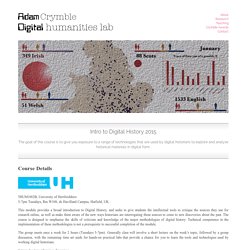
This module provides a broad introduction to Digital History, and seeks to give students the intellectual tools to critique the sources they use for research online, as well as make them aware of the new ways historians are interrogating those sources to come to new discoveries about the past. The course is designed to emphasise the skills of criticism and knowledge of the major methodologies of digital history. Technical competence in the implementation of these methodologies is not a prerequisite to successful completion of the module.
The group meets once a week for 2 hours (Tuesdays 5-7pm). Hybrid Pedagogy. Data Science and Machine Learning. R is fast becoming the tool of choice for data scientists in a variety of fields.
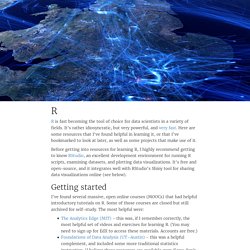
It's rather idiosyncratic, but very powerful, and very fast. Here are some resources that I've found helpful in learning it, or that I've bookmarked to look at later, as well as some projects that make use of it. Before getting into resources for learning R, I highly recommend getting to know RStudio, an excellent development environment for running R scripts, examining datasets, and plotting data visualizations.
It's free and open-source, and it integrates well with RStudio's Shiny tool for sharing data visualizations online (see below). Getting started I've found several massive, open online courses (MOOCs) that had helpful introductory tutorials on R. The Analytics Edge (MIT) - this was, if I remember correctly, the most helpful set of videos and exercises for learning R. My first work with R was in another MOOC, which shall remain nameless. Programming Historian. We invite you to browse around.
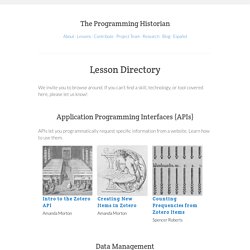
If you can’t find a skill, technology, or tool covered here, please let us know! Application Programming Interfaces (APIs) APIs let you programmatically request specific information from a website. Learn how to use them. Data Management. Day of DH 2014 - A Day in the Life of the Digital Humanities. Attend An ODH Funded Institute. Digital Humanities Data Curation As the materials and analytical practices of humanities research become increasingly digital, the theoretical knowledge and practical skills of information science, librarianship, and archival science- which come together in the research, and practice of data curation - will become more vital to humanists.
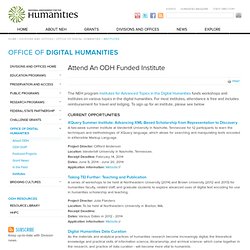
The three-day workshop will provide a strong introductory grounding in data curation concepts and practices, focusing on the special issues and challenges of data curation in the digital humanities. Learning will be largely case-based, supplemented by short lectures, guest presentations, and practical exercises. Project Director: Trevor Muñoz. The Programming Historian 2. Dhresourcesforprojectbuilding [licensed for non-commercial use only] / Tutorials for DH Tools and Methods. The Alliance for Networking Visual Culture » Updates. Announcing Our Summer Schedule of Scalar Webinars April 17, 2014 The Scalar development team will be offering a series of free online webinars this summer.
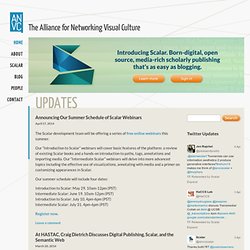
Our “Introduction to Scalar” webinars will cover basic features of the platform: a review of existing Scalar books and a hands-on introduction to paths, tags, annotations and importing media. Our “Intermediate Scalar” webinars will delve into more advanced topics including the effective use of visualizations, annotating with media and a primer on customizing appearances in Scalar. Omeka. Digital Humanities. Humanities Day 2012: Digital Humanities Forum by UChicago 449 views How is the digital changing the way that humanities scholars look at the past?
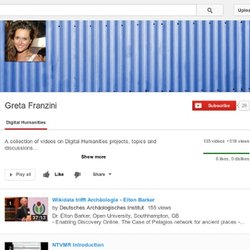
This forum showcases several ongoing projects by faculty that utilize network visualization, text-mining, geo-spatial mapping, and other digital techniques to augment and/or reframe more traditional lines of humanistic inquiry. How have these techniques changed the kinds of questions that scholars are asking? How should they be integrated with established methods of interpretation? SHERPA/RoMEO - Publisher copyright policies & self-archiving. Visualization Lab. Association for Computers and the Humanities.
Association for Computers and the Humanities. The annual Digital Humanities conference is an opportunity for the ACH to pursue in-person many of the initiatives that we support more virtually during the year.
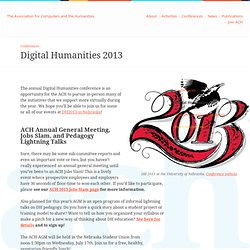
We hope you’ll be able to join us for some or all of our events at DH2013 in Nebraska! ACH Annual General Meeting, Jobs Slam, and Pedagogy Lightning Talks. Maker Lab in the Humanities » University of Victoria » Makerspace. Gender, New Media, and Technology. HASTAC. What Is Digital Humanities? For people who do more than use The Google. Www.arl.org/storage/documents/publications/code-of-best-practices-fair-use.pdf. Writing History in the Digital Age. Institutes for Advanced Topics in the Digital Humanities. These NEH grants support national or regional (multistate) training programs for scholars and advanced graduate students to broaden and extend their knowledge of digital humanities.
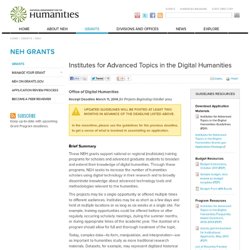
Through these programs, NEH seeks to increase the number of humanities scholars using digital technology in their research and to broadly disseminate knowledge about advanced technology tools and methodologies relevant to the humanities. The projects may be a single opportunity or offered multiple times to different audiences. Institutes may be as short as a few days and held at multiple locations or as long as six weeks at a single site. Digital Humanities Summer Institute. EPIC - Electronic Privacy Information Center. HASTAC. Dev Bootcamp - Learn Ruby on Rails in 9 weeks. What Is Digital Humanities? Digital Campus. Open Journal Systems Made Easy. Digital Humanities Now. Web hosting provider - Bluehost.com.
Welcome To CheapHostPlus, Cheap Web Hosting Solution, Hosting Server SSL Web. Digital Humanities Questions & Answers. An interdisciplinary journal about regions, places, and cultures of the American South and their global connections. Play The Past. THATCamp: The Humanities and Technology Camp. Home Page. The Future of Archives in a Digital Age. Scholarship and teaching in the humanities are undergoing a seismic shift, from a culture once based almost entirely on in-person and printed exchange to one reliant on a combination of traditional communications and digital technologies.
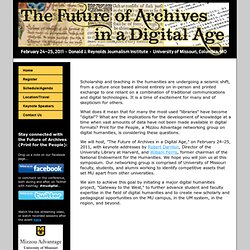
It is a time of excitement for many and of skepticism for others. What does it mean that for many the most used "libraries" have become "digital"? NANO: New American Notes Online. DHQ: Digital Humanities Quarterly: Spring 2011. Managing 100 Digital Humanities Projects: Digital Scholarship & Archiving in King’s Digital Lab James Smithies, King's College London; Carina Westling, King's College London; Anna-Maria Sichani, King's College London; Pam Mellen, King's College London; Arianna Ciula, King's College London Modelling Medieval Hands: Practical OCR for Caroline Minuscule Brandon W. Hawk, Rhode Island College; Antonia Karaisl, Rescribe Ltd; Nick White, Rescribe Ltd Towards 3D Scholarly Editions: The Battle of Mount Street Bridge Costas Papadopoulos, Maastricht University; Susan Schreibman, Maastricht University.
PressForward. Arts-humanities.net: guide to digital humanities & arts. JAH - The Promise of Digital History. This “Interchange” discussion took place online over the course of several months in the winter of 2008. We wanted the “Interchange” to be free flowing; therefore we encouraged participants not only to respond to questions posed by the JAH but also to communicate with each other directly. What follows is an edited version of the very lively online conversation that resulted. We hope JAH readers find it of interest. The JAH is indebted to all of the participants for their willingness to enter into an online conversation: Daniel J. Michael Frisch is professor of history and American studies and a senior research scholar at the University at Buffalo, State University of New York. Patrick Gallagher is a leader in the field of exhibit design. Steven Mintz is director of the Graduate School of Arts and Sciences Teaching Center at Columbia University.
Kirsten Sword is assistant professor of history at Indiana University. William G. William J. William G. William J. Digital History. Digital History: A Guide to Gathering, Preserving, and Presenting the Past on the Web. This book provides a plainspoken and thorough introduction to the web for historians—teachers and students, archivists and museum curators, professors as well as amateur enthusiasts—who wish to produce online historical work, or to build upon and improve the projects they have already started in this important new medium. It begins with an overview of the different genres of history websites, surveying a range of digital history work that has been created since the beginning of the web. The book then takes the reader step-by-step through planning a project, understanding the technologies involved and how to choose the appropriate ones, designing a site that is both easy-to-use and scholarly, digitizing materials in a way that makes them web-friendly while preserving their historical integrity, and how to reach and respond to an intended audience effectively.
On this website, we present a free online version of the text. , Barnes and Noble, or U. of Penn. Press.